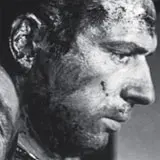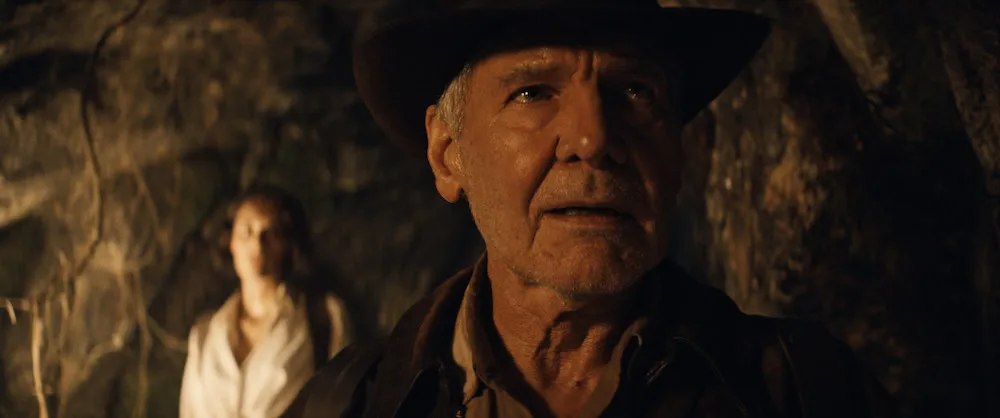 Time magazine called The Wages of Fear (1953) “one of the most evil” movies ever made. It is hard to get much better publicity than that, but unfortunately this was at the height of McCarthyism and Cold War paranoia. The perceived anti-social and anti-American sentiments in the French film forced 20 minutes to be cut for its release in the States two years later. Considering that director Henri Georges Clouzot’s film is a masterpiece of tightly plotted tension, I can only imagine how the edited down version played out. Thankfully Criterion was able to restore the excised footage in the early 1990’s and subsequently presented the classic French cinema as originally intended on laserdisc, DVD and now a beautiful Blu-ray edition.
Time magazine called The Wages of Fear (1953) “one of the most evil” movies ever made. It is hard to get much better publicity than that, but unfortunately this was at the height of McCarthyism and Cold War paranoia. The perceived anti-social and anti-American sentiments in the French film forced 20 minutes to be cut for its release in the States two years later. Considering that director Henri Georges Clouzot’s film is a masterpiece of tightly plotted tension, I can only imagine how the edited down version played out. Thankfully Criterion was able to restore the excised footage in the early 1990’s and subsequently presented the classic French cinema as originally intended on laserdisc, DVD and now a beautiful Blu-ray edition.
The story’s core revolves around four derelict expatriates who have found their way to Las Piedras, a squalid South American town that subsists off work from the American corporation Southern Oil Company. It is SOC’s dehumanizing treatment of the locals that comes off as critical of American imperialism and resulted in the attacks against the film. The isolated town is compared to a prison where it is “easy to get in, but escape is impossible” leading the four to jump at the lucrative chance to truck several hundred pounds of nitroglycerine 300 miles through rough jungle and precarious rocky terrain on often makeshift roads.
The mission is considered suicide which explains SOC using locals who are viewed as expendable, and the participants are more than willing as they have so little to risk seeing themselves trapped in their current condition. It is this bleak view of human life that permeates not just The Wages of Fear but all of Clouzot’s work. What makes it a success in this instance is the precise control and slow burning, often claustrophobic tension the director instills in the narrative and visual composition.
The film’s first hour situates the characters both within the impoverished town and their nihilist desperation. By the time the four men depart, we are presented with life stripped down through a lack of morality and common decency with characterizations that I cannot imagine most will find amiable. However there is an “anti-hero” nuance present in that you feel how much existential circumstances have shaped their priorities. The remaining hour plus of the runtime dealing with the transportation of the explosives is some of the most purposely paced “teeth grinding” cinema I have seen with such a dangerously undetermined feeling that you truly do not know who, if anyone, will survive.
William Friedkin’s 1977 effort Sorcerer was a remake of Wages and while that film has its merits (especially with a bigger budget), watching Clouzot’s original allows you see how much inspiration the later director took and how much of the earlier film’s subtle flavor was lost. The Wages of Fear is not a feel good or inspirational movie that will play to modern moviegoers’ tastes. It is an intense, existential thriller that has not weakened in repeat viewings over the years. I have said this before and stand by it; if I can rewatch a film knowing exactly how it will play out but still find myself tense and watching with bated breath, I consider that a success. By these standards, Wages of Fear is a definite success.
Criterion delivers The Wages of Fear to Blu-ray with a 1080p AVC encoded transfer preserving the original aspect ratio of 1.37:1. While this Black & White image does not necessarily scale to the high-def heights of The Third Man or The 400 Blows, it is still quite beautiful. The print does show very minimal damage but what minute scratches or pops remain after Criterion’s thorough restoration effort are not overly offensive in consideration to the gains achieved. The image is generally sharp with close-ups showing amazing detail (especially the grit and sweat on the actor’s faces) and contrast is for the most part excellent with solidly resolved blacks.
The main visual deficit is a disparity between some of the shots. While they are a minority, there are moments when the image becomes noticeably soft with weak contrast and lack of detail. Considering Criterion’s track record and the effort put into the restoration, I am guessing this was the best the source material could provide in these moments. As noted, these are only a small portion of the overall film that otherwise holds up quite beautifully in high-def and will easily be the best classic film lovers will have ever seen it look (as seems to be the case with each of the company’s Blu-ray editions to date).
Criterion continues their dedication to providing only the original audio for a film. The French/English monaural soundtrack is replicated in uncompressed LPCM 1.0 audio with optional English subtitles. As with the video, the high-def audio brings out the best the source material has to offer and has been cleaned up with no distracting pops, clicks or hissing. There are a few moments such as with the explosions where the track shows its limitations, but, for the most part, this is a very satisfying experience with clear dialog and good reproduction of the score and environmental effects especially surrounding all the nerve wracking time spent in the trucks.
Criterion’s earlier Blu-ray editions came in distinctive “eco-friendly” digipack style cases with cardboard slipcovers. There was mixed reaction with many liking the cases since they set themselves apart while others bemoaned the “flimsiness” of the cardboard packaging.
For whatever reason, Criterion has changed their strategy and is issuing their most recent Blu-rays in more traditional plastic cases that still have a few differences. While maintaining the same height and width as a normal BD case, the new packaging is deeper matching the form factor of a Playstation 3 game or a U.K. import Blu-ray and is clear instead of blue. For my tastes I prefer the new cases if for no other reason than better durability and hope the company settles on this as their standard BD packaging.
All the extras from the 2005 DVD release have been ported over for the BD. While we do not get a commentary, there are several video interviews, an overview of the changes made to the 1955 American cut and a 50-plus minute history of Clouzot’s life and work. All video is in HD 1080i resolution with the exception of “Censored” which is in 1080p. While the extras do not boast stunning video quality, the high-def mastering does make them much more palatable than many low quality standard-def extras we get these days. Also included is Criterion’s standard insert booklet with an essay “No Exit” by author Dennis Lehane (Mystic River, Gone Baby Gone) detailing the themes of the movie.
Interview With Michel Romanoff (22:26) – Interview recorded for the 2005 DVD with assistant director Romanoff. He explains how he joined the crew for Wages at the age of 27 when he was new in the business and how much Clouzot taught him. He also covers choices in casting and shooting in southern France.
Interview With Marc Godin (10:09) – Another interview recorded in 2005 with Clouzot biographer in French with English subtitles. He gives a high level overview of the director painting him as neurotic, depressed, pessimistic and lacking a sense of humor though this is supposed to be explanatory rather than demeaning.
Interview With Yves Montand (5:00) – Short interview shot in 1988 with the main actor who explains how Clouzot renewed his interest in film.
Henri-Georges Clouzot: The Enlightened Tyrant (52:34) – The best extra provided, this documentary produced in 2004 gives a biography of the notoriously difficult director in French with English subtitles. Several actors/actresses, a film historian, the director’s brother and second wife all give input into what drove Clouzot creatively. It covers all of his film output including work on Wages and how his pessimistic attitude to life drove his art and his demanding attitude on set. One of the most interesting moments is Bridgette Bardot explaining a particular instance of the director’s intense inspirational method during filming that began with him slapping her and ending with her kicking him in the groin.
Censored (12:12) – An overview of the scenes that were removed for the American 1955 cut along with article excerpts giving each context. This is very interesting to watch explaining the perceived anti-American and homosexual themes.
The Wages of Fear may not be to everyone’s taste but is a perfect example of intense psychological cinema that has stood the test of time. Criterion is continuing their exemplary track record of Blu-ray editions with this release. While Wages does not trump their previous restoration efforts such as The 400 Blows, it easily falls into the “best we have and are likely to see” category on home video with a worthy high-def presentation. Add to that a solid set of supplements and new sturdy plastic packaging making this the definitive version of this French classic to own.
– Robert Searle


